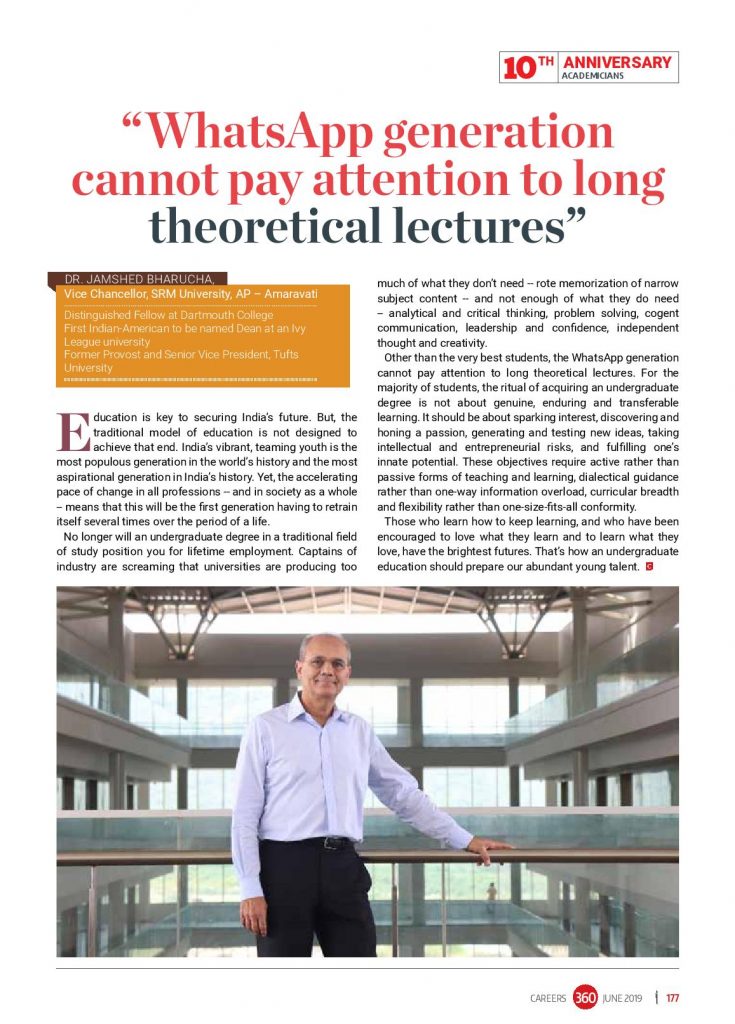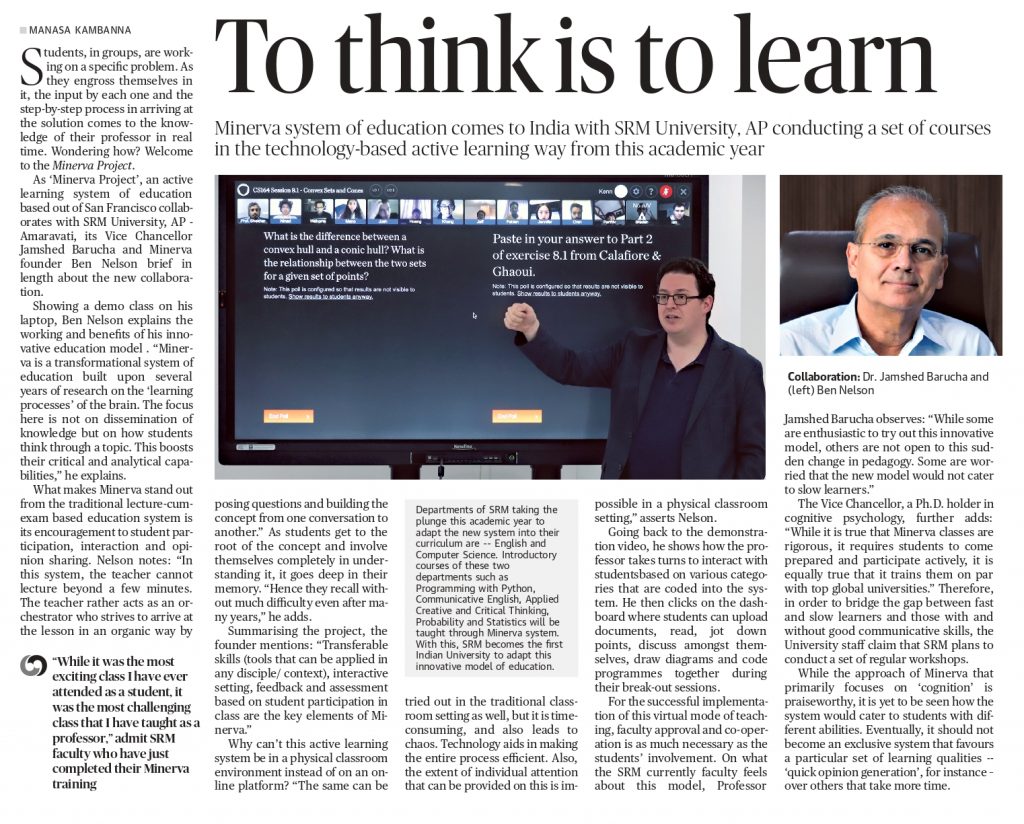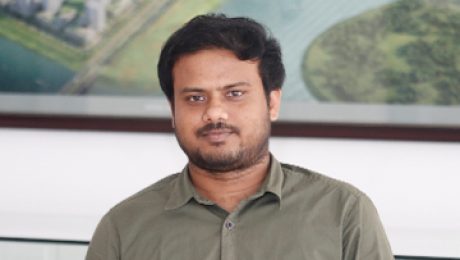“WhatsApp generation cannot pay attention to long theoretical lectures” – Dr. Jamshed Bharucha, Vice Chancellor, SRM AP
- Published in Newsroom
VC Bharucha at BUSINESSWORLD’s panel discussion on “Bridging the gap between Institution and Industry”
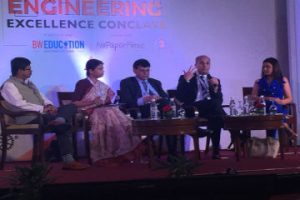 July, 2019: Jamshed Bharucha, VC of SRM AP, Amaravati was invited as a panel member in the second edition of BW Businessworld Engineering Conclave held in New Delhi. In the premise of increasing dynamism in the industry, the discussion on ” Future Skills: Are our engineers ready to adopt the global changes?” hold its own relevance.
July, 2019: Jamshed Bharucha, VC of SRM AP, Amaravati was invited as a panel member in the second edition of BW Businessworld Engineering Conclave held in New Delhi. In the premise of increasing dynamism in the industry, the discussion on ” Future Skills: Are our engineers ready to adopt the global changes?” hold its own relevance.
Bharucha expressed his concern saying, ” Most of the engineers are not working in their field. What is missing from the curriculum is skill development that would help in learning new things. We are still following a failed way of learning i.e. passive learning, where the communication is one way but in SRM, we promote active learning by involving students during the process of learning as this will facilitate the problem-solving skills”. SRM AP has active learning classrooms where regular sessions are designed with a relentless focus on improving student learning outcomes and ensuring student success in high-demand careers. Our students actively participate and engage in discussion, debates, and conversations that intrigues their interest and improves their skills. Also, for the first time in India, SRM AP introduces Collegiate Accelerator Programme presented by Minerva forum to advance the intellectual development of each student.
- Published in Uncategorized
Industry-Academia Collaboration Towards Engineering Education Excellence
Second BW Businessworld Education Engineering Excellence Conclave saw a panel discussion on ‘Industry-Academia Collaboration towards Engineering Education Excellence’.
In the education industry, industrial exposure or collaboration is of paramountcy. In India, this collaboration of on-field experience and academia has been neglected for years and if the focus isn’t shifted towards this collaboration then India is going to have a lack of skilled workforce, professional and technical people.
- Published in Newsroom
Dr. Tewari receives Homi Bhabha National Institute’s Outstanding Doctoral Student Award
Dr. Somesh Vinayak Tewari, Assistant Professor, Department of Electrical and Electronics Engineering (SRM University AP) was awarded the prestigious “Outstanding Doctoral Students Award”, from Homi Bhabha National Institute (HBNI) at an event held at the Department of Atomic Energy (DAE) Convention Centre, Anushaktinagar, Mumbai. Dr. Tewari was presented this award for his PhD thesis titled “Study of surface flashover of insulator in gases at high pressure.”
- Published in Departmental News, EEE NEWS, News
Next Tech Lab undergraduates present ‘Smart Irrigation Solution for Farmers’ at the 10th ICCCNT at IIT Kanpur
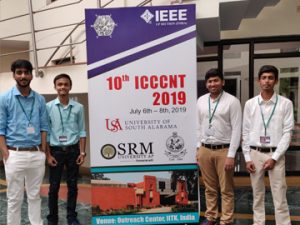 July 6th-8th, 2019: Second and third year B.Tech students, Agniswar Paul – ECE 3rd year, Fahad Kamraan – CSE 3rd year, Ajay Kumar – CSE 2nd year, Jaideep Cherukuri – CSE 2nd year, together presented a paper on “Low-cost IoT+Machine Learning (ML) design for smart farming using multiple applications” at the 10th ICCCNT held at IIT Kanpur. The model developed is a breakthrough in the context of Indian agriculture, providing smart irrigation solutions, based on weather forecasts. This cost-effective, ML infused technology (alert system for farmers) will help improve the yield through crop suggestion and weather determination.
July 6th-8th, 2019: Second and third year B.Tech students, Agniswar Paul – ECE 3rd year, Fahad Kamraan – CSE 3rd year, Ajay Kumar – CSE 2nd year, Jaideep Cherukuri – CSE 2nd year, together presented a paper on “Low-cost IoT+Machine Learning (ML) design for smart farming using multiple applications” at the 10th ICCCNT held at IIT Kanpur. The model developed is a breakthrough in the context of Indian agriculture, providing smart irrigation solutions, based on weather forecasts. This cost-effective, ML infused technology (alert system for farmers) will help improve the yield through crop suggestion and weather determination.
- Published in News
Asian Consortium on Computational Materials Science – International Conference on Material Genome (ACCMS-ICMG)
The Asian Consortium on Computational Materials Science (ACCMS) was set up in 2000 in order to nurture and promote research and development activities in computational materials in Asian countries. ACCMS entered into the 16th year of existence and the conduct of 10 successful conferences and 12 general meetings of this virtual organization have boosted the computational materials research in the Asian region. In order to optimally utilize our resources and manpower, it is widely felt that we should have a ‘real’ organization to steer young researchers towards computational research. It is envisaged that the conduct of International Conference on Material Genome at SRM University, AP-Amaravati, will lay the foundation for an active center of ACCMS on campus. For more details: https://srmap.edu.in/accms-2020/
- Published in Conferences
Dr. Sheela Singh
- Published in Associate Professor, Faculty, ME Faculty, SEAS
Academic Calendar – 2019-2020
Get access to view Semester wise academic calendar for the year 2019 – 2020
- Published in Announcements
Dr. Amit Kr Mandal
- Published in Assistant Professor, CSE Faculty, Faculty, SEAS


